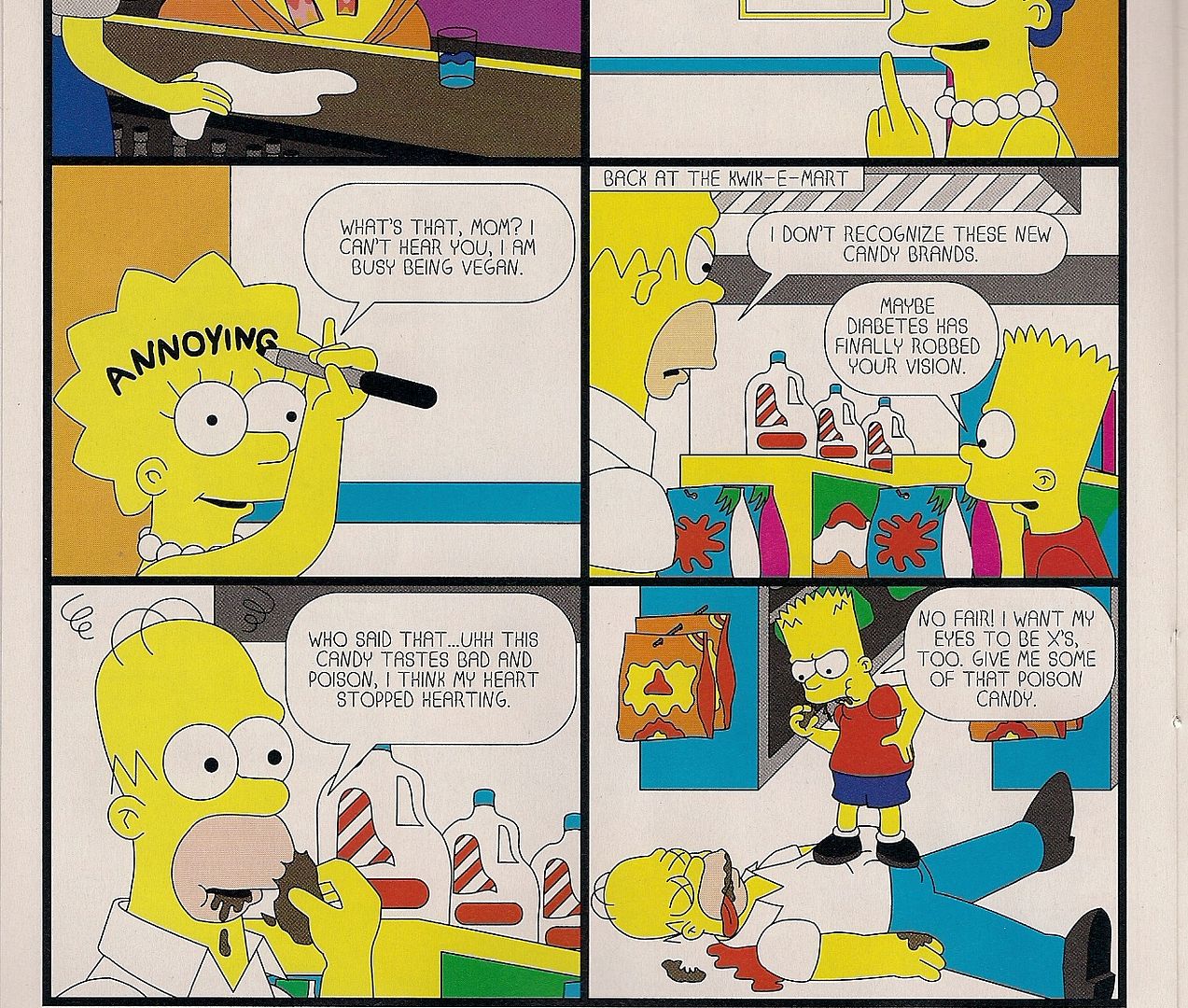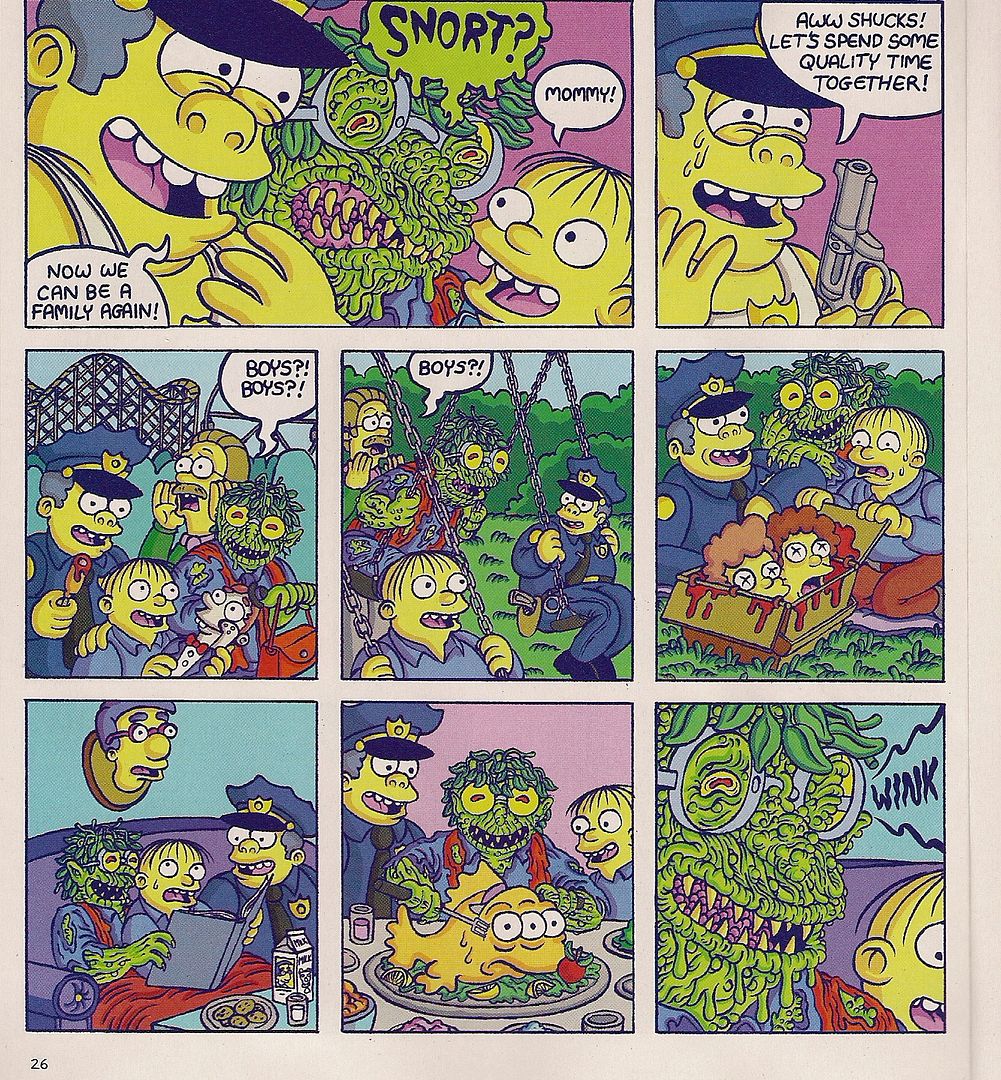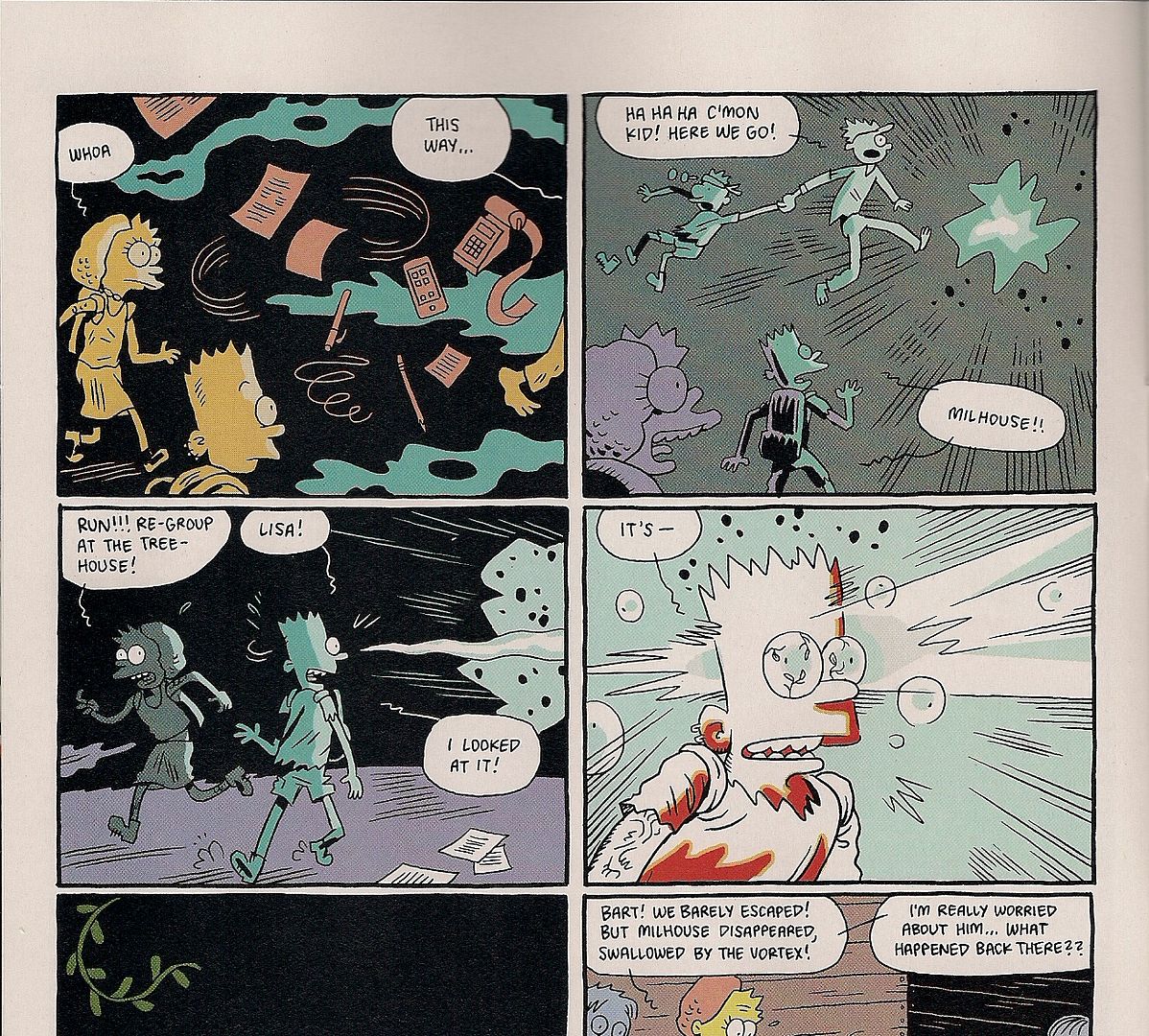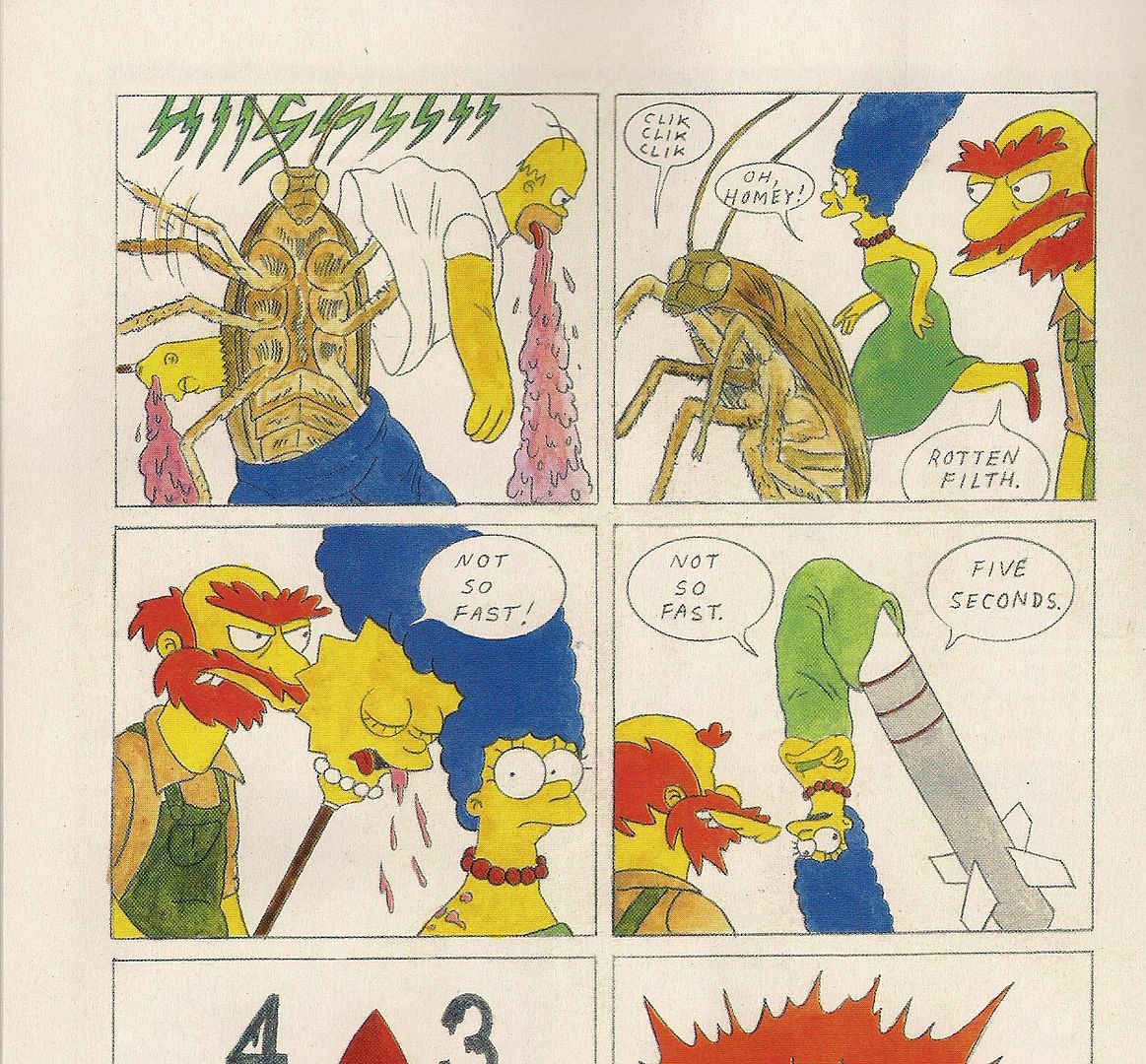The New Mainstream
Treehouse of Horror #15

(Ben Jones)
Yeah, I sorta loved this.
I liked Strange Tales #1 just fine too. Funny stuff by Nicholas Gurewitch, Jason and Johnny Ryan, some nice visuals by Dash Shaw and Paul Pope, something damn close to a comprehensive summary of personal motifs by Junko Mizuno, and Michael Kupperman just being himself. It was fun, nice. Overall, it gave the impression of a big superhero company, Marvel, willing to loosen its corporate tie for a while and have a little fun with its treasury of characters.
Bongo's Treehouse of Horror #15, on the other hand, gives the impression of a publisher, former alternative strip cartoonist Matt Groening, who hasn't forgotten how he blew stacks of money and a truckload of funnybook political capital printing Gary Panter and Mary Fleener comics in the mid-to-late '90s, and doesn't regret it much at all. And that makes a world of difference here, beloved world media franchise or not.

(John Vermilyea)
The table of contents of this 48-page, all-content, $4.99 annual blames Groening by name for the results, which makes sense; the Simpsons mastermind is a newly-minted Kramers Ergot veteran, so he surely knew what he was getting into with Kramers mastermind Sammy Harkham grabbing the editorial reins and picking up choice members of his Kramers krew to take the franchise out for a ride.
I haven't read many Simpsons comics, so I'm not sure if plopping Groening's signature at the bottom of the title page to every story -- regardless of how little the visual style employed actually resembles Groening's -- is supposed to be a running gag or if it's standard operating procedure, but it works perfectly as a joke either way. These are Groening's characters, after all, known to an alarming percentage of the world population, but it's all gone so horribly wrong.
That's sort of the appeal behind all of these 'alternative comics folk do big famous characters' anthology projects, granted, but this one takes it uniquely far. Strange Tales, for all its good humor, is just that: pure humor, neatly contextualizing these offbeat artists as gentle jesters for the curious, good for a three-issue laugh then ready to be put away in their happy rear-of-Previews realm when it's time to get back down to the serious comic book business of superheroes.
The Simpsons, however, already is a comedy so it doesn't have that tonal buffer; moreover, the artists here -- and I haven't read any of the prior Treehouse annuals, so hell, maybe they're all like this -- seem especially intent on toying around with narrative as well as tone, bringing the characters to truly surreal places, where texture and ideas tend to take control of otherwise Simpsons-like stories. It's often really funny stuff, but it pushes back against the characters too - Tim Hensley signals this right from the start, as the Wally Gropious author rolls out Simpsons comic label namesake and Life in Hell star Bongo to preside over a funny-scary breakdown of the traditional Simpsons opening couch gag. Not to ruin anything, but it ends with the couch in question sitting empty in an open grave.
Hey, it's Halloween. These things happen. Like with old-timey cinematographers, who only knew how to shoot things in the traditional style, until you told 'em it was a dream sequence.

(word by Matthew Thurber, art by Kevin Huizenga)
The best story in here is from Cold Heat co-creator Ben Jones, who's made excellent comics for a while now, whether alone or with others, like in Paper Rad. Here he provides a disquietingly close 10-page comics approximation of a Simpsons television episode, complete with a B plot about Lisa becoming a deeply annoying vegan, neatly boiled down to a string of awesomely blunt vegans are fucking annoying gags ("...she said while we ate pizza she would be feeding some cows her blood to offset our family's dairy footprint"). The main storyline, meanwhile, sees much of Springfield gradually dropping dead from so-cheap-it's-toxic Kwik-E-Mart candy, only to be replaced by overseas Simpsons character bootlegs, starting off with the famous Black Bart and quickly moving into weird territory.
Amazingly, the story manages to be totally of a piece with Jones' work while never quite failing to be a Simpsons thing too. Half the effect comes from Jones' perfectly on-model character images -- all the better to abuse in mutant form -- but he also nails the cadence of Simpsons conversation, which he then spikes with extra-gross humor and, once the bootlegs have taken over, finely broken language.
And while it's certainly sarcastic and political in the fine Simpsons tradition, if a bit more cutting (Apu: "We are just doing what any good American company would do... kill an entire town, then outsource and exploit the third world to repopulate it with--"), don't miss Jones' own Tux Dog popping up as a set of bootleg unlicensed costumes; after all, Jones has been known to whip up some unofficial Bart cameos in his other works. And just as with those, there's a great affection for what the characters mean to people at play, as Black Bart in his Malcom X t-shirt makes peace with a Soviet Homer, and they roam a more grotesque, sometimes awful, but certainly more colorful city.
Some of the other artists stick to what they do best, to differing effects. Will Sweeny has a mythical Bart and Homer encounter basically the same type of foodstuff creatures as from Tales From Greenfuzz series and John Kerschbaum (I think the only non-Kramers artist here) turns up the gore for a ramble through multiple fairy stories, while John Vermilyea pays homage to C.H.U.D. as a monster Hans Moleman stalks the city's children until joy takes over and the dialogue fades away.
Everything in here is at least okay, and typically filled with oh-my-god-Homer-is-saying-my-words glee -- few contributors can resist having Nelson walk on for a quick laff -- but the best wrangle with the franchise at every opportunity, like Matthew Thurber's & Kevin Huizenga's vision of a near-future Springfield ruined from financial collapse and the now-teenage-or-thereabouts kids (except for Maggie, amusingly still a baby) coping with a Green revolution apparently from beyond sanity. Digressive and rather dark, even a bit despairing of a counterculture co-opted by dark forces.

(C.F.)
That's actually a through line in this comic, perhaps evidence of Harkham's careful editorial hand. From Jones' model sheet cataclysm to Thurber's & Huizenga's financial meltdown and shadow villains to Jeffrey Brown's line of copyright infringement jokes -- in the middle of a parody of the seminal '70s television chiller Bad Ronald -- there's a real uncertainty here about corporate, franchised, advertising-ready work, not a unified manifesto or anything but an indication that this work-for-hire stuff is getting knocked against aesthetic values, that the issue of participating in these kinds of owned mega-profit comics can't just be put away when the work is done because you've signed onto it, that art like this has its own implications. Who's name's always on the bottom?
Again, though, these notions co-exist with the comedy, which gives the anthology a depth I think, say, Bizarro Comics lacks. But then, just as Halloween is the season for going crazy, so is the Simpsons a ready enough forum for these political questions, given its long history and irreverent disposition. And ready too for cartoon frenzy, as C.F. closes the curtain with Groundskeeper Willie smashing into the living room and doing battle with deadly fake monster-military Marge & Homer. That's all there is, until next week.

(Ben Jones)
Yeah, I sorta loved this.
I liked Strange Tales #1 just fine too. Funny stuff by Nicholas Gurewitch, Jason and Johnny Ryan, some nice visuals by Dash Shaw and Paul Pope, something damn close to a comprehensive summary of personal motifs by Junko Mizuno, and Michael Kupperman just being himself. It was fun, nice. Overall, it gave the impression of a big superhero company, Marvel, willing to loosen its corporate tie for a while and have a little fun with its treasury of characters.
Bongo's Treehouse of Horror #15, on the other hand, gives the impression of a publisher, former alternative strip cartoonist Matt Groening, who hasn't forgotten how he blew stacks of money and a truckload of funnybook political capital printing Gary Panter and Mary Fleener comics in the mid-to-late '90s, and doesn't regret it much at all. And that makes a world of difference here, beloved world media franchise or not.

(John Vermilyea)
The table of contents of this 48-page, all-content, $4.99 annual blames Groening by name for the results, which makes sense; the Simpsons mastermind is a newly-minted Kramers Ergot veteran, so he surely knew what he was getting into with Kramers mastermind Sammy Harkham grabbing the editorial reins and picking up choice members of his Kramers krew to take the franchise out for a ride.
I haven't read many Simpsons comics, so I'm not sure if plopping Groening's signature at the bottom of the title page to every story -- regardless of how little the visual style employed actually resembles Groening's -- is supposed to be a running gag or if it's standard operating procedure, but it works perfectly as a joke either way. These are Groening's characters, after all, known to an alarming percentage of the world population, but it's all gone so horribly wrong.
That's sort of the appeal behind all of these 'alternative comics folk do big famous characters' anthology projects, granted, but this one takes it uniquely far. Strange Tales, for all its good humor, is just that: pure humor, neatly contextualizing these offbeat artists as gentle jesters for the curious, good for a three-issue laugh then ready to be put away in their happy rear-of-Previews realm when it's time to get back down to the serious comic book business of superheroes.
The Simpsons, however, already is a comedy so it doesn't have that tonal buffer; moreover, the artists here -- and I haven't read any of the prior Treehouse annuals, so hell, maybe they're all like this -- seem especially intent on toying around with narrative as well as tone, bringing the characters to truly surreal places, where texture and ideas tend to take control of otherwise Simpsons-like stories. It's often really funny stuff, but it pushes back against the characters too - Tim Hensley signals this right from the start, as the Wally Gropious author rolls out Simpsons comic label namesake and Life in Hell star Bongo to preside over a funny-scary breakdown of the traditional Simpsons opening couch gag. Not to ruin anything, but it ends with the couch in question sitting empty in an open grave.
Hey, it's Halloween. These things happen. Like with old-timey cinematographers, who only knew how to shoot things in the traditional style, until you told 'em it was a dream sequence.

(word by Matthew Thurber, art by Kevin Huizenga)
The best story in here is from Cold Heat co-creator Ben Jones, who's made excellent comics for a while now, whether alone or with others, like in Paper Rad. Here he provides a disquietingly close 10-page comics approximation of a Simpsons television episode, complete with a B plot about Lisa becoming a deeply annoying vegan, neatly boiled down to a string of awesomely blunt vegans are fucking annoying gags ("...she said while we ate pizza she would be feeding some cows her blood to offset our family's dairy footprint"). The main storyline, meanwhile, sees much of Springfield gradually dropping dead from so-cheap-it's-toxic Kwik-E-Mart candy, only to be replaced by overseas Simpsons character bootlegs, starting off with the famous Black Bart and quickly moving into weird territory.
Amazingly, the story manages to be totally of a piece with Jones' work while never quite failing to be a Simpsons thing too. Half the effect comes from Jones' perfectly on-model character images -- all the better to abuse in mutant form -- but he also nails the cadence of Simpsons conversation, which he then spikes with extra-gross humor and, once the bootlegs have taken over, finely broken language.
And while it's certainly sarcastic and political in the fine Simpsons tradition, if a bit more cutting (Apu: "We are just doing what any good American company would do... kill an entire town, then outsource and exploit the third world to repopulate it with--"), don't miss Jones' own Tux Dog popping up as a set of bootleg unlicensed costumes; after all, Jones has been known to whip up some unofficial Bart cameos in his other works. And just as with those, there's a great affection for what the characters mean to people at play, as Black Bart in his Malcom X t-shirt makes peace with a Soviet Homer, and they roam a more grotesque, sometimes awful, but certainly more colorful city.
Some of the other artists stick to what they do best, to differing effects. Will Sweeny has a mythical Bart and Homer encounter basically the same type of foodstuff creatures as from Tales From Greenfuzz series and John Kerschbaum (I think the only non-Kramers artist here) turns up the gore for a ramble through multiple fairy stories, while John Vermilyea pays homage to C.H.U.D. as a monster Hans Moleman stalks the city's children until joy takes over and the dialogue fades away.
Everything in here is at least okay, and typically filled with oh-my-god-Homer-is-saying-my-words glee -- few contributors can resist having Nelson walk on for a quick laff -- but the best wrangle with the franchise at every opportunity, like Matthew Thurber's & Kevin Huizenga's vision of a near-future Springfield ruined from financial collapse and the now-teenage-or-thereabouts kids (except for Maggie, amusingly still a baby) coping with a Green revolution apparently from beyond sanity. Digressive and rather dark, even a bit despairing of a counterculture co-opted by dark forces.

(C.F.)
That's actually a through line in this comic, perhaps evidence of Harkham's careful editorial hand. From Jones' model sheet cataclysm to Thurber's & Huizenga's financial meltdown and shadow villains to Jeffrey Brown's line of copyright infringement jokes -- in the middle of a parody of the seminal '70s television chiller Bad Ronald -- there's a real uncertainty here about corporate, franchised, advertising-ready work, not a unified manifesto or anything but an indication that this work-for-hire stuff is getting knocked against aesthetic values, that the issue of participating in these kinds of owned mega-profit comics can't just be put away when the work is done because you've signed onto it, that art like this has its own implications. Who's name's always on the bottom?
Again, though, these notions co-exist with the comedy, which gives the anthology a depth I think, say, Bizarro Comics lacks. But then, just as Halloween is the season for going crazy, so is the Simpsons a ready enough forum for these political questions, given its long history and irreverent disposition. And ready too for cartoon frenzy, as C.F. closes the curtain with Groundskeeper Willie smashing into the living room and doing battle with deadly fake monster-military Marge & Homer. That's all there is, until next week.

<< Home